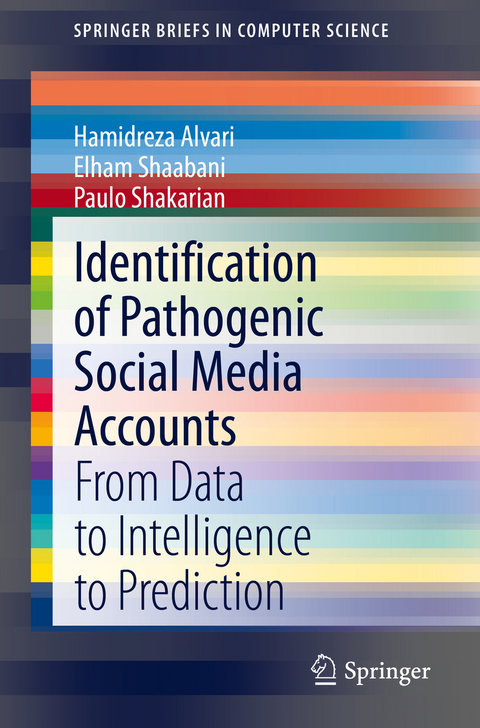
Identification of Pathogenic Social Media Accounts
Springer International Publishing (Verlag)
978-3-030-61430-0 (ISBN)
Over the past years, social media has played a major role in massive dissemination of misinformation online. Political events and public opinion on the Web have been allegedly manipulated by several forms of accounts including "Pathogenic Social Media (PSM)" accounts (e.g., ISIS supporters and fake news writers). PSMs are key users in spreading misinformation on social media - in viral proportions. Early identification of PSMs is thus of utmost importance for social media authorities in an effort toward stopping their propaganda. The burden falls to automatic approaches that can identify these accounts shortly after they began their harmful activities.
Researchers and advanced-level students studying and working in cybersecurity, data mining, machine learning, social network analysis and sociology will find this book useful. Practitioners of proactive cyber threat intelligence and social media authorities will also find this book interesting and insightful, as it presents an important andemerging type of threat intelligence facing social media and the general public.
lt;b>Hamidreza Alvari is a Ph.D. candidate in Computer Science at Arizona State University. He is a researcher at the Cyber-Socio Intelligent System (CySIS) Laboratory under Dr. Paulo Shakarian. His research interests lie at the intersection of social network analysis, artificial intelligence and cybersecurity. His works have been published in top conferences and journals including WWW, SDM, CIKM, ASONAM and SNAM. He is a recipient of multiple awards including Best Paper Award, Engineering Grad Fellowship and Travel Awards. He received his masters in Artificial Intelligence from Shiraz University, Shiraz, Iran.
Paulo Shakarian, PhD is the CEO and Co-Founder of Cyber Reconnaissance, Inc., (CYR3CON) which specializes in combining artificial intelligence with information mined from malicious hacker communities to avoid cyberattacks. Shakarian also holds a tenure-track position at Arizona State University as a Fulton Entrepreneurial Professor. He has written numerous articles in scientific journals and has authored several books, including Elsevier's Introduction to Cyber-Warfare and Cambridge's Darkweb Cyber Threat Intelligence Mining. He has led research efforts funded by IARPA, DARPA, ONR, AFOSR, and ARO. Shakarian was named a "KDD Rising Star," received the Air Force Young Investigator award, received multiple "best paper" awards and has been featured in major news media outlets such as CNN and The Economist. CYR3CON, Shakarian's company, has received multiple industry accolades including awards from PwC, Cisco, and the DoD. Previously, Paulo was an officer in the U.S. Army where he served two combat tours in Iraq, earning a Bronze Star and the Army Commendation Medal for Valor. He also previously worked as an Assistant Professor at West Point. Paulo holds a Ph.D. and M.S. in computer science from the University of Maryland, College Park, and a B.S. in computer science from West Point (with a Depth of Study in Information Assurance).
Elham Shaabani, Ph.D., is a data scientist at Walmart Labs. She received her PhD in computer science from Arizona State University. Her research interests are artificial intelligence and its applications to the real-world problems. Her work has been published in Springer, KDD, CIKM, ASONAM, SNAM, and WWW. She received the "Best paper award" and "Best poster award" from ICDIS 2019 and ICDIS 2018, respectively. She holds MSc and BSc in computer engineering from Amirkabir University of Technology.
| Erscheinungsdatum | 06.01.2021 |
|---|---|
| Reihe/Serie | SpringerBriefs in Computer Science |
| Zusatzinfo | IX, 95 p. 25 illus., 19 illus. in color. |
| Verlagsort | Cham |
| Sprache | englisch |
| Maße | 155 x 235 mm |
| Gewicht | 177 g |
| Themenwelt | Informatik ► Datenbanken ► Data Warehouse / Data Mining |
| Informatik ► Netzwerke ► Sicherheit / Firewall | |
| Informatik ► Theorie / Studium ► Künstliche Intelligenz / Robotik | |
| Schlagworte | causal inference • community detection • cybersecurity • Data Mining • deep neural networks • machine learning • misinformation • Pathogenic Social Media Accounts • Social Bots • Social Media • terrorism |
| ISBN-10 | 3-030-61430-1 / 3030614301 |
| ISBN-13 | 978-3-030-61430-0 / 9783030614300 |
| Zustand | Neuware |
| Informationen gemäß Produktsicherheitsverordnung (GPSR) | |
| Haben Sie eine Frage zum Produkt? |
aus dem Bereich


